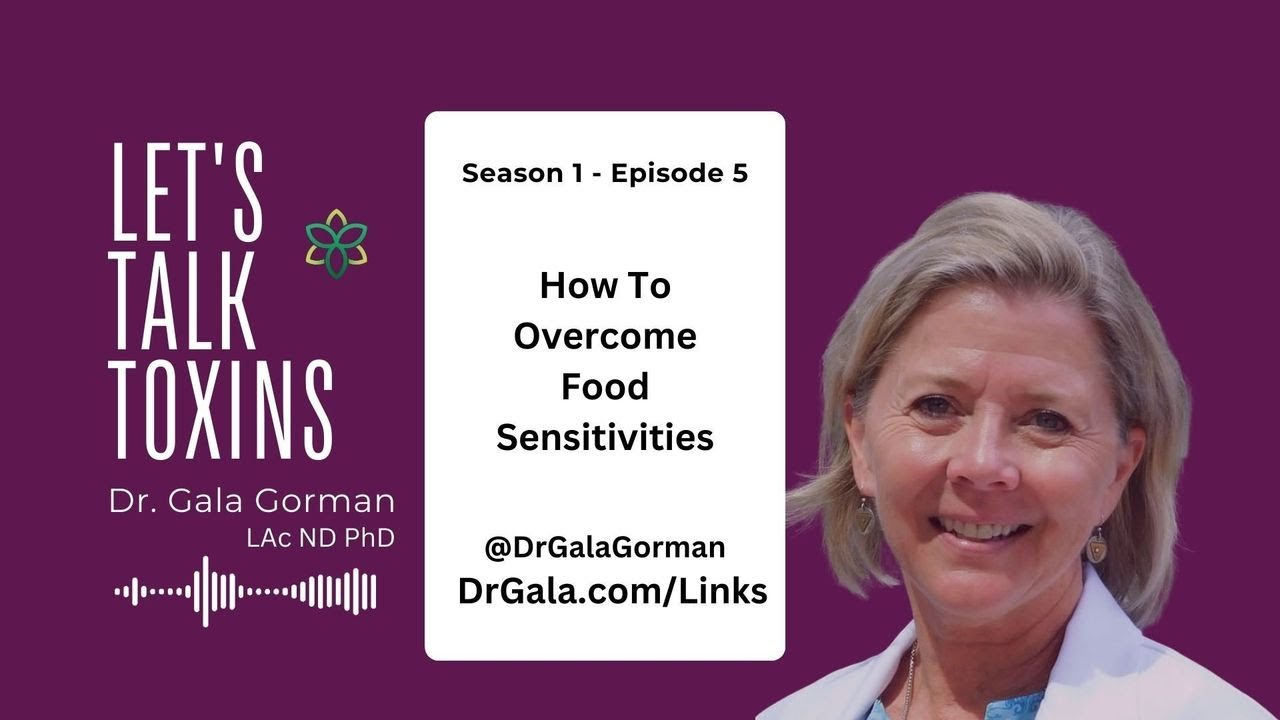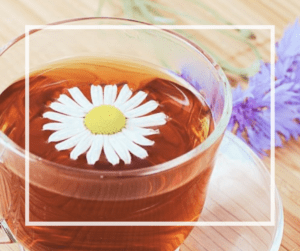NOTE: A machine generated this transcript. Please be aware that it may contain occasional errors in punctuation and spelling.
All of these symptoms suppressors are clear indications that you’ve got food sensitivities that are not being managed properly. For example, if you have acid reflux, then rather than trying to suppress your stomach acid, just know that most likely the acid reflux is the result of having not enough stomach acid and this happens for a number of reasons.
Welcome to the Let’s Talk Toxins show. I imagine enjoying all your favorite meals without the discomfort and bloating that food sensitivities can bring. In this episode, we’re diving into how you can overcome food sensitivities and start feeling better with every bite. If certain foods leave you feeling tired or sluggish, even though they’re supposed to be healthy or maybe you experienced bloating after meals and can’t figure out why, understanding and managing food sensitivities can transform the way you eat and feel.
And if you’re new here, I’m Dr. Gala Gorman. I’m a licensed acupuncturist, naturopath and author of “What’s Your Kryptonite?” I wrote the book to help women understand the effects of chronic stress that’s turned toxic. In the book, I share the MOLT Method™. I developed to make it easy to shed stress along with the accumulated toxicity… just like any other creature in nature. That’s outgrown its trappings.
So that you can cruise through midlife and beyond symptom-free so that you can put an end to health issues like chronic fatigue, insomnia, mood swings, and even weight gain.
Well, MOLT in this case is an acronym. The T stands for toxins.
And I can say with confidence that every symptom is caused by accumulated toxicity. I evaluate 12 categories of toxicity when I’m working with someone to unravel the health mystery. Our world is full of man-made substances that our bodies were not designed to deal with. Coupled this toxicity with an overwhelming amount of toxic stressors the body was designed to manage and it’s no wonder women find themselves playing “whack-a-mole” with symptoms.
And this segment, I share information from research studies related to toxicity. You can think of it as a toxin trend. So this report was research from the University of California, Irvine. And it’s revealed how much disruption it causes internally when your circadian clock or bio rhythms, essentially are disrupted.
So our circadian rhythms, our circadian clock, is this body’s internal 24-hour biological pacemaker, essentially. And this may accelerate the progression of colorectal cancer is what they found, by affecting the gut microbiome and intestinal barrier function.
So just know that your gut microbiome controls a lot more than just whether or not you’re going to get colorectal cancer. In fact, the serotonin, which is one of the happy brain chemicals that really equates to us even feeling satisfaction in life, production starts in the gut. So gut health is extremely important. What are some signs that maybe you’ve got an issue with gut health?
Well, we start by looking at maybe when you’re waking up during the night. If you’re not sleeping really soundly and you’re waking up regularly between 1 and 3:00 AM, this is a sign that your liver is somewhat toxic. And so there are a lot of things you can do to help support your liver and give it a break, essentially.
It’s trying to do a lot of cleanup work overnight. And when it’s overwhelmed, maybe even still trying to process what you consumed later in the evening, it does not have the energy and resources, essentially, to do the repair work that it’s supposed to be doing overnight. The other thing I will say is that, I’m pointing to what I just mentioned. There’s a case for eating earlier in the day and making your last meal in the afternoon, this is referred to as early time restricted eating.
So, in Oriental medicine, the period of time between 1:00 and 3:00 correlates to our small intestine and our small intestine is really what’s doing most of the work and helping our body to basically turn what we’re consuming into nutrients that are usable. And so between 1 and 3:00 PM is when we should be eating our largest meal.
This is the best time to give your body its nutrients. The other thing I will say is that if you are feeling low energy, maybe even chronic fatigue, keep that eating window between 7:00 AM and 3:00 PM. Again, this is more or less considered early time restricted eating. That is an eight hour eating window.
And most of us can eat two, even three meals in that eight-hour window and still feel satisfied. You may go to bed on a little bit of an empty stomach, but honestly, that’s exactly what you want to do. That’s going to free up a lot of energy for your liver. So if you’re curious about this circadian clock and what the other two-hour segments correlate with, well, the lung is for Oriental medicine.
That’s where we start. That’s the lung and that’s between 3:00 and 5:00 AM. The large intestine is between 5:00 and 7:00 AM. And I will say that the absolute best time to have your main bowel movement of the day is between 5:00 and 7:00 AM. So, if you’re one of those fortunate women who are waking up in the morning before 7:00 AM and really feel the urge to have a bowel movement, just know that that’s a good sign, that things are working pretty well internally. The next period of time is for the stomach that’s 7:00 to 9:00.
So if you’re one of those people who really needs to eat something in the morning for breakfast, maybe you have a job and it really, dictates what your availability is for meals, then I’m eating earlier in the morning between 7:00 and 9:00. Your body is definitely still going to do a pretty good job of handling that. Our spleen, which is essentially the pancreas, is a correlated to between 9:00 and 11:00.
And this is when, our body is best designed to handle more carb heavy meals. So, if you really want to eat something that is more carb-heavy, best to do it in your morning meal. This does not give you a license to eat donuts. But if you like oatmeal or something like that, then eating it in the morning, your body supports this. The digestive system supports this. Next, our heart is from 11:00 to 1:00, and our small intestine is from 1:00 to 3:00. And then there are a couple of organs, 3:00 to 5:00 and 5:00 to 7:00, that is kidney and bladder.
And then a couple of more organs that are really more or less, just unique to Oriental medicine, and that is the pericardium and what’s known as the San Jiao or triple warmer. And then the gallbladder is from 11:00 PM to 1:00 AM and the liver is from 1:00 AM to 3:00 AM. So that takes us all the way through the 24-hour circadian clock. And just know that if you’re having issues repeatedly during a certain window of time, that can be a sign that you’ve got some issue related to that system.
So remember, these are not necessarily organs. These are systems in our body In Oriental medicine, each one of these represents a whole system internally. And so, as we’re trying to get to the root cause of what’s really going on and what’s creating symptoms for us, we’re looking at all these different signs and clues and biomarkers so that we can unravel the mystery and really address the root cause, reverse the chronic disease and the underlying stress that’s causing it.
Chapter 12 in my book, “What’s Your Kryptonite?” is dedicated to helping readers manage what I refer to as “Tricky Toxins.”
Our bodies are bombarded with toxicity… so, we have to learn to manage it. Just comment, Tricky Toxins and we’ll send you a link where you can download the chapter for free. If commenting isn’t convenient, go to Dr. Gala.com forward slash links and sign up for my newsletter. You can respond to any email you received from me with “Tricky Toxins” and we’ll send you a link.
Well, every suggestion you’ll hear from me has been tested in the trenches. And that includes saying no to symptom suppression over the past four decades. I’ve developed processes that work sustainably typically requires a combination of approaches that I’ve synthesized to address the health issues that show up repeatedly for many women. And this segment I’m opening the kimono to share a, how I was challenged to apply my suggestions.
I’m walking my talk and here’s an example. So, I had really let clutter accumulate in the last few years. I guess it started. Around, you know, five years ago when all the craziness started. Can you believe it’s almost been five years, four and a half years at this point. So I’m so that’s just mind blowing really, but clutter had really accumulated and I kept thinking that. Some or something miraculous would happen, I guess. To solve the problem, but I kept kicking the can down the road and every time I thought about it, I just thought, oh, that just does not sound like fun.
If you follow the law of attraction, you know that you really shouldn’t do something. If you feel just really bad about it. So I had to really soothe myself. And really coax myself into accepting that. Even though it might be a little challenging to get the process started. I was going to feel so much better. As I started to peel through some of this accumulated clutter.
And it’s been really fascinating because I’ve gotten through several areas now at this point, and they’re not a hundred percent done because there’s obviously residual work that needs to be done. But every time I walk into those rooms, it just brings a smile to my face and this is just one of the ways that clearing clutter, helps us molt stress.
In fact, this is the “O” and the MOLT Method™ it’s creating order in our lives. And that disorder clutter really adds stress. And it just, you know, accumulates and when we then go through a stressful period and we’ve already got this low level stress going on, our stress escalates really quickly.
So we want to control any stress that we have control over and clearing the clutter is one of the ways we do this.
I actually developed a little plan for myself. And then if I miss one, it’s not going to hurt anything because hopefully at least I won’t go years and allow clutter to accumulate again.
But if I just clear my desk soft, one time a month. Maybe clear out the refrigerator one time a week, clear the closets out one time a year. And then maybe really go over the, to-do-list.
If you can maintain a, to-do-list daily and really refresh it every day.
If you plan for what you’re going to get done the next day. You’re going to feel so much better. You’re going to get much more done. Be way more productive. And more importantly, you’re going to feel productive and that is going to really lift your mood and everything in your life is going to work better.
Now, let’s talk about how to overcome food sensitivities. And when I’m done drop a comment and let me know if you’ve overcome food sensitivities and what strategy works for you.
So to start with, let’s talk about the ways that we suppress symptoms that are actually related to food sensitivities. So, one of the things I hear regularly is that people have been told to use digestive enzymes.
And so there may be occasions where digestive enzymes are called for. For example, if you have acid reflux, then rather than trying to suppress your stomach acid, just know that most likely the acid reflux is the result of having not enough stomach acid and this happens for a number of reasons. I’ve got another video that does a better job of explaining it in detail. But if you need to use hydrochloric acid or digestive enzymes in the short term to help rebuild your stomach acid and heal your digestive track, then there’s nothing wrong with that.
But what you don’t want to do is turn to digestive enzymes long-term so that you can keep eating things that don’t agree with you. That’s just a recipe for disaster in the longterm.
The other things we see are people turning to medications like Omeprazole or ending up with type two diabetes and being insulin dependent. So all of these symptoms suppressors are clear indications that you’ve got food sensitivities that are not being managed properly. So, I spoke for a minute ago about low stomach acid and a lot of people will find this surprising and don’t really understand how could that be possible?
And so, you may be somebody who’s known that you had issues with your diet and maybe even tried an alkaline diet, for example. So if you’ve eaten a vegan or vegetarian diet, it’s very common for those people to end up to alkaline. It really slows the digestion down. And then what ends up happening as our stomach acid diminishes the valve that closes is actually triggered by your stomach acid and so your valve that closes to your esophagus won’t close properly or completely.
And so, really makes it a challenge. People end up with this acid reflux and and all kinds of digestive issues. But more importantly, you’re not going to assimilate your nutrients. If your stomach is low in an acid, and you’re going to end up not. Your small intestine does the separating, but that’s typically after your stomach has broken things down appropriately.
And so if things are getting in to your small intestine that haven’t been broken down properly because of low stomach acid, then you can imagine the problem that, that creates all the way down the digestive track. So, one of the ways that we end up with digestive issues is through low food quality.
And so sometimes it’s the type of food and there’s just no two ways around it. So you might use yeast, for example. So if you consume foods with too much yeast in them, your body will develop a yeast overgrowth and it doesn’t really matter too much. Whether that’s better yeast or worse yeast, yeast is yeast, and your body really can only manage so much of it.
And so, that’s one example, but more often we see these chemicals that are introduced into our food supply. So for example, if you think that you’re going to avoid gluten. Then you need to make sure that the gluten or the wheat that you’re consuming is organic, because if it’s not organic, it may be sprayed with chemicals like Glyphosate.
And so, if, you are trying to avoid chemicals, which you should be then glyphosate is one of those chemicals forever chemicals that are really, really challenging to pull out of your system once they accumulate. The other thing I will say is that there are some reports that even organic grains are sprayed with glyphosate to preserve them as they move through the food chain.
And so that’s really concerning and you just want to make sure that you’re using really high quality ingredients and that you know, where they are coming from. The other thing too, I will say is that a lot of these low quality foods are simply not satisfying. They fill you up, but they really don’t bring any satisfaction.
That’s when you find yourself rummaging around in the pantry or the refrigerator an hour or two after you eat. You should feel satisfied for four to six hours after eating, if that’s not happening then your, the quality of food you’re eating is really just not getting the job done.
So I will also say that do not recommend that you never treat yourself. Having little treats is just one of the ways that we bring ourselves joy. And so, if you really crave something sweet, have something really high quality that you really, really enjoy. So, for example, if you really love ice cream, don’t eat fake, no-sugar ice cream. Get the real thing, really, you know, high-quality gelato or something like that, and really enjoy it.
You’ll find that that’s satisfying, and then you won’t need it again in another hour or two.
I have a couple of things I still want to share with you so that you can overcome food sensitivities, but remember you can get the Tricky Toxins Chapter of my book, “What’s Your Kryptonite?” For free just comment, “Tricky Toxins“. And we’ll send you a link where you can download the chapter.
If commenting isn’t convenient, go to DrGala.com forward slash links and sign up for my wellness weekly newsletter. You can respond to any email you received from me with tricky toxins, and we’ll send you a link.
Now let’s continue with a couple of additional things. I want you to know about overcoming food sensitivities. And, don’t forget, when I’m done drop a comment and let me know how you deal with food sensitivities.
So the next thing I want to talk about here is genetics. So our immune system is developed actually in utero. When we’re still an unborn fetus, essentially. And it’s fascinating. They now really are making the connection between using antibiotics early in life, like an infancy and how much damage that does to our immune system really creates lifelong damage.
That’s very hard to reverse something that I know for myself, I was on antibiotics. Nonstop when I was an infant. And it has definitely contributed to my digestive issues that I work hard to manage every day. And so, if you’re one of those people just know you’re not alone. Sometimes when we have a compromised immune system, this leads to more food sensitivities and the average person. But just know that stress also reduces your tolerance. So when you are stressed, your immune system is taken offline and then any other issues that you are able to manage, fairly easily. We’ll, all of a sudden seem to escalate. And so it really isn’t all of a sudden that they escalated it’s that you were dealing with this low level of constant stress, constant internal stress from these food sensitivities, but then you added additional stress. S from some source. Potentially even emotional stress, maybe busy time at work or something else in your life.
And then that stress basically was more than your body can manage simultaneously.
So, how do we reverse food sensitivities? Well, you might start by thinking about it, like you would consider allergy treatment. So, if you’ve ever been to an allergy doctor, a lot of people with food sensitivities also really struggle with allergies, but essentially what an allergy doctor does is they introduce that substance, if you will, in micro doses and basically trigger your immune system to deal with it so that it develops sort of a, a history of knowing what to do.
And so I do the similar thing with homeopathy and it’s easier and less side effects essentially. But the allergy treatment basically is sensitizing you to be able to handle things on an ongoing basis. But the really important thing to recognize is that you need to reduce toxicity overall to free up resources so that your body can handle these additional stressors, because they are stressors.
If you are sensitive to these things, you will find that your body has less of a tolerance for them. And sometimes, they really are triggering your immune system because your digestive system doesn’t have the appropriate makeup essentially genetically, to be able to deal with that component. But it also can be just the chemicals that were put into that item.
I know for myself with wheat as an example, I can get bread from one place and I can immediately notice a reaction, and then I can eat bread from another place, and it seems to not really affect me at all. And that is a clear indication that there is something in the supply, the supplier’s ingredients, essentially, that is different.
Either chemicals, either where they’re sourcing it from that the genetic makeup of it is more problematic. But just know that, just because you get away with it, from one place and not another doesn’t mean that you don’t have a problem. This is one of the things that happens where people really get down the wrong rabbit hole because they think, “Well, it couldn’t possibly be this because I don’t have that reaction all the time.”
Dairy is another thing that a lot of people have a problem with, and they think, “Well, it couldn’t possibly be dairy because I didn’t have a reaction after I consumed the dairy.” But it takes up to three days for the effects of dairy to fully express in your system. And so what tends to happen is we eat a little bit of something today, I got away with it, eat a little something tomorrow..
Oh, got away with it by day three, you’re having a problem. And you’re thinking, “Well, it couldn’t possibly have been that because I got away with it 1, 2, 3 days.” So just know that all of these things that create food sensitivities, or essentially that are considered things that are common for people to have a sensitivity to, may not show up like an allergic reaction, essentially like with anaphylactic shock or pending doom in that kind of way. They’re way more subtle if they really cause that dramatic of a problem, we would have already dealt with it.
And because they’re subtle, the toxicity just accumulates little by little over time and builds up the toxic stress in our body.
The answers I give to questions I receive quite often apply to and would be helpful for most women.
I’ve accumulated a few related questions and I’ll answer them in this segment…. Ask away!
If you’d like to ask a question, I created a form so that it’s sure to get answered. And your question could be shared in a future episode, helping many other women. So comment, question, and we’ll get you a link to the form. And if commenting isn’t convenient, go to Dr. Gala Duff form forward slash links and sign up for my wellness weekly newsletter.
You can respond to any email you received from me with question and we’ll send you a link. So here’s the first question.
How can I tell if I’m dealing with a food intolerance versus a real food allergy?
The telltale sign a full food allergy is anaphylactic shock, and this is life-threatening. Believe me, if you have a food allergy, you’re going to know it. The symptoms that we see accumulate from food sensitivities often seem unrelated. So, really, it’s difficult to pinpoint that these are food sensitivities unless you have somebody like me encouraging you to just try to eliminate them and see if you don’t feel better and have surprising improvement.
You will also find that you react differently potentially even to something that you’ve actually got a full-blown allergy to. You’ll potentially react differently based on your stress level. When you are more stressed, your immune system is compromised. And your immune system is really a critical component of dealing with these food sensitivities.
Essentially, when you have a sensitivity to something, it is considered a foreign pathogen by your body and your immune system. Your immune system kicks into high gear and tries to deal with it, and that can be really problematic. As you know, that creates all sorts of health issues.
Are there any natural remedies or supplements that can really help suppress symptoms from food sensitivities?
Well, I will say that many people take something, for example, like Lactaid, if they have a problem with dairy, and I don’t recommend that you do this. If you really know you’ve just got something, a special event or something like that, and you want to take some enzymes just to kind of help you get through it, enjoying food with family is important as long as it’s a special occasion and not regularly even every week. But these enzymes essentially improve your body’s own ability to be able to deal with these things.
But what I will tell you is that even if you supplement with the enzymes, your body is still deficient in what it needs to be able to handle that, and you are still having internal reactions. So, enzymes are not going to solve the problem. They may just buy a little time and get you a little bit of relief in the short term, if this is a special occasion kind of situation.
The other thing I will say is that hydrochloric acid is being recommended regularly, and this is due to low stomach acid. And so, a lot of people who. have digestive issues really believe, or maybe even have been told, that they have an overproduction of stomach acid. And in many cases, it’s the opposite. They actually have low stomach acid. So, taking things that are going to suppress your stomach acid may solve the problem really super short term, but it really is kicking the can down the road and creating a longterm problem.
Hydrochloric acid can be helpful to supplement with in the short term, if you’ve got an issue that, you know, you need to sort of get your stomach acid back to appropriate levels. It can be helpful to use it in the short term. And I don’t have a problem generally with supplementing with anything short term, when we’ve got a known deficiency and we know what we’re doing, we know what we’re addressing, and we’re not using it as a way to suppress symptoms so that we can continue to add toxic stress into our bodies.
Another thing too, that some people will take is probiotics. And so probiotics, prebiotics, this is another one of those things that you do not want to be taking long-term. This is something that you take whenever your digestive system has been disrupted to kind of give it a little boost and repopulate it with what the appropriate balance would be.
But if you take these things, long-term, you’re going to end up with an overgrowth, potentially in the wrong direction. And so, nothing should be taken longterm. I never recommend taking a supplement long-term What are the risks of relying on symptom suppressors for my food sensitivities?
Well You know that whatever the symptom suppressors are that you’re taking, for example digestive enzymes. Even medication, Omezaprole The any sort of pain relievers, even if you’re taking something that actually is a pain reliever. All of these things are basically. Just allowing you to fool yourself that you are getting away with it.
And the truth is that you are a hundred percent not getting away with it and you’re causing a lot of internal damage and that damage is accumulating. The way I describe it is that you are creating dis-ease and dis-ease escalates to disease. And so we do not want to hang out in a state of dis-ease for an extended period of time.
And that’s what symptom suppressors allow you to do. So you really just want to avoid suppressing symptoms. It’s not a strategy that is going to get you where you want to go longterm.
If I’m using symptom suppressors regularly, how can I still identify my actual food triggers?
Well, you know that I don’t recommend that you use symptom suppressors regularly. Rather, I recommend that you eliminate the likely triggers and that you kind of get your body out of that overreacting mode. And we need to do that really before we even check some of these other things, because when your body is really inflamed because of these food sensitivities, even if we do some of the other tests, the tests may show false positives or even false negatives because there’s so much inflammation going on.
It’s hard to know what to prioritize. So, I would recommend that you use something like my Human Energy System Reboot for a week and then have a blood test. If this is something that you really feel strongly about, that you want to continue using your symptom suppressors and go back to your old diet, then I would suggest a blood test at that point after you’ve just turned down the heat a little bit internally and just know that it’s best whenever you do some of these tests that you do them when you have really kind of diminished the stress and this internal toxic stress that these food sensitivities create is one way that stress shows up.
And we know that there’s, you know, countless ways that this happens, including just the emotional day-to-day stress that we’re trying to manage. So, as we clean up our diet and you know, do something, for example, one of the 7 ways that I recommend in the Human Energy System Reboot is the avoiding what I refer to as the “Fierce 5 just for a week. And, and really, you will be surprised that in just a week, you will see remarkable results.
What lifestyle changes can I make to reduce my reliance on symptom suppressors for food sensitivities?
Well, again, one of the 7 ways that I recommend you initiate a Human Energy System Reboot is what I refer to as the “Fierce 5 avoiding the Fierce 5 and the Fierce 5 is dairy, gluten, yeast, sugar, and alcohol.
Honestly, there’s no diet that needs any of those components to be healthy, so you will not miss any of those components if you really want to lead a healthy lifestyle. So it might sound extreme at first, but you’ll be surprised that it’s actually pretty easy to swap some things out and you won’t even find that you miss things too much. I mean, you know, there are special occasions where we want to re-introduce, you know, I love a piece of chocolate cake, for example, with buttercream frosting, you know, so that definitely would not qualify if I’m eliminating the Fierce 5 The other thing that I will suggest is my MOLT Method™, and in that membership, we focus on all the ways that stress shows up. We focus on our mindset, which is the M and MOLT. The O is for Order. From time to time, we’ll have challenges to clear clutter and create more order to improve our productivity.
And that will make us feel less stressed. Then, obviously, there’s a lot of lifestyle adjustments we can make that will really help us be able to manage these kinds of things like food sensitivities better. And then, just generally, to be able to address the toxicity, to deal with the toxins.
And I evaluate 12 categories of toxicity and those categories of toxicity show up in countless ways. And so, if we’re trying to minimize reduce the toxic sources in our world then it’s really helpful to know what our body is struggling to manage.
So, remember if you’d like me to answer your specific question, make sure to comment “QUESTION”, and we’ll send you a link to the submission form. You’ll want to subscribe to the channel notifications to get regular updates. And that’s a wrap for this episode.
This has been the Let’s Talk Toxin show.
Make sure you subscribe to my channel on YouTube and activate the notifications. You’ll get a reminder when I’m going live next. Until then, be well.













